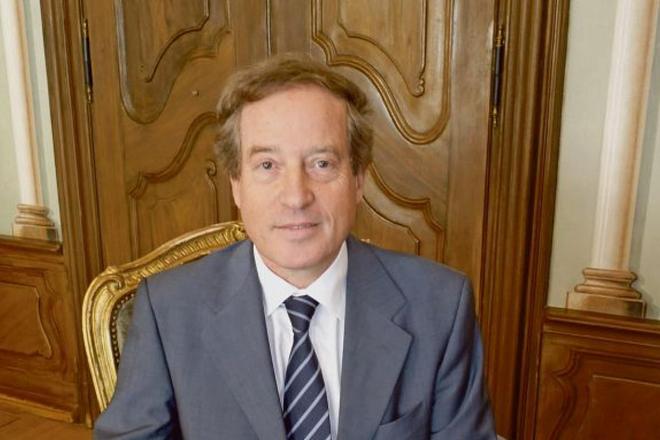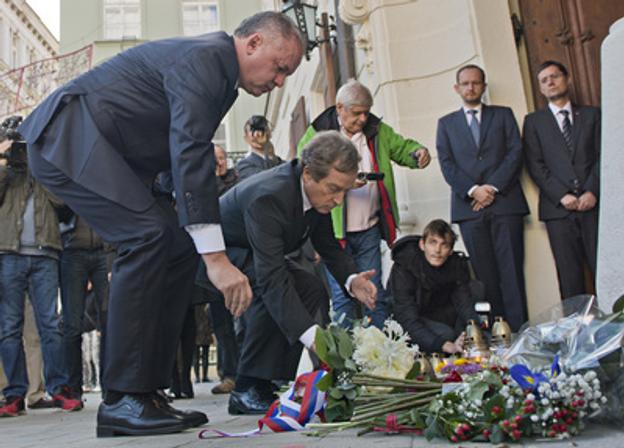The Slovak Spectator (TSS): Slovakia recently filed a lawsuit against the European Council’s decision to introduce quotas for the redistribution of refugees. How is this perceived in France?
Didier Lopinot (DL): For France, it is clear that EU member states have the duty to welcome people fleeing massacres such as the Syrian regime’s cruel bombings and the slaughter perpetrated by Daesh. France will, thus, take in 30,000 refugees as part of the relocation scheme. Besides, it is absolutely necessary to show our solidarity and not to confuse Islam with violence and terrorism. However, like Slovakia, we are also convinced that the EU must be responsible and better control its external borders. Therefore, we are calling for the implementation of “hot spots” in Greece and Italy, as well as for the setting up a true European border and coast guard system. At the same time, we welcome the discussions held between the EU and Turkey and we strive for the stabilisation of Syria.
TSS: In the aftermath of the terrorist attacks in Paris, French authorities asked Slovakia for military assistance. How is the cooperation proceeding?
DL: After the attacks, France decided to activate article 42.7 of the Treaty on European Union, which allows EU member states to ask for help if they are “the victim of armed aggression” on their territory. The other member states should then provide “aid and assistance by all the means in their power”. Our main goal is to encourage larger participation of our EU partners in order to facilitate the redeployment of some of our military forces from the Sahel region to the Middle East where we are fighting against Daesh. I’m very happy to say that Slovakia has answered positively to our request and will send five staff officers and military experts to the EUTM Mali mission, devoted to training members of the Malian army so that they can join the UN operations to restore the integrity of Mali. We are very grateful to Slovakia for its solidarity: it is a historical decision since it would be the first time that Slovakia actively participates in a military mission in Africa.
TSS: The COP21 resulted in the Paris Agreement. In your previous opinion piece for the Sme daily together with the German and the UK ambassadors you wrote that “this is also an opportunity to make Paris a turning point in the fight against climate change if we want to pass on to our children a planet in which it is worth living”. Have the delegates and the politicians lived up to this?
DL: When the agreement was announced on December 12, we were all aware that we were living a historical moment. The Paris Agreement – universal, ambitious, balanced and legally binding – is definitely a turning point in the fight against climate change, “a revolution for climate” as President Hollande put it. In the first place, it retains the target of holding the increase in average temperature to well below 2°C and pursuing efforts to limit this increase to 1.5°C. Secondly, it makes reducing greenhouse gas emissions everyone’s responsibility, through the submission or updating, every five years, of national contributions. Finally, it focuses on adaptation to the effects of climate change and provides for the resources needed to enable universal access to sustainable development. By adopting this comprehensive agreement, the international community lived up to its responsibility towards the citizens of the world and to our children. We can all be relieved that such decisions were made in Paris; of course, this agreement is also good news for Slovakia, which is exposed, as is every single country, to the negative impacts of climate disruption. Nevertheless, we have to keep in mind that the Paris agreement is only a first step on a long road in our fight against climate change and movement towards resilient, low-carbon economic development. In this regard, Slovakia will have an important role to play in 2016, since it will be presiding over the EU Council at the time of the next COP, in Marrakech.
TSS: Slovakia is preparing for its first EU Council presidency. How do you assess the preparations thus far? What can Slovakia learn from its predecessors?
DL: Slovakia has been fully and very actively engaged in the preparation of its first presidency of the Council of the EU for quite some time now. Within the Ministry of Foreign and European Affairs, many people are preparing the presidency, from the State Secretary Ivan Korčok to the secretariat of the EU presidency. I also note that during the past two years Slovakia has prepared more than 100 diplomats and nearly 1,000 experts for the presidency, including by improving their ability to work in French (an important asset in EU), with the support of the Institut Français de Slovaquie. We are also considering the secondment of a French diplomat to assist the Slovak presidency. And I know that Slovak authorities have been in close cooperation with the very experienced Netherlands that will hold the presidency just before them, in the framework of the so-called trio with Malta, as the following European president. Furthermore, Slovakia has benefited from its experience of the V4 presidency, one of the most active and fruitful in last years. So we are fully confident that the Slovak presidency will be efficient, successful, and ready to face the unexpected challenges that will probably show up during its term.
TSS: Your mission in Slovakia started during the second half of 2013 and in terms of your goals you singled out economic diplomacy including attracting more small and medium-sized enterprises to the Slovak market and cooperation in science and technology. Which of your goals have you managed to fulfil?
DL: Economic diplomacy as well as scientific cooperation are, indeed, two of my main priorities since I arrived in Slovakia in late 2013. On both accounts, progress has been made. Regarding economic diplomacy, our trade deficit with Slovakia decreased in 2014 compared to previous years and the trends are encouraging for 2015, but more work needs to be done. On the investment front, I’ve been glad to witness the reinforcement of some of our long established SMEs in Slovakia (Courbis, Steep, CCN, Pernoud and others) and to welcome new investments by bigger companies like PSA, but also in the retail (Decathlon) or commercial real estate sectors (Unibail-Rodamco), proving that Slovakia remains very attractive to French companies. I would love to see the reverse, meaning some Slovak companies investing in France. That will be one of our focuses for the year to come. As for scientific and technological cooperation, we are especially proud of the FabLab, a workshop offering digital fabrication, inaugurated one year ago in the premises of the Slovak University of Technology. In 2015, we focused our action on climate and energy, ahead of the COP 21. We organised many events, including scientific ones, and I trust that business opportunities will also increase quickly. In 2016, I would like to organise events on the digital economy, in order for French and Slovak (or V4) firms active in this field to know each other and cooperate.
TSS: Do you consider possibilities for French investors in Slovakia as fully tapped? Where do you see space for development?
DL: With 380 subsidiaries and 29,000 employees, in a decade France has become one of the main investors in Slovakia, just behind Germany and Austria. Most of the largest French companies are present in Slovakia, as well as many SMEs, in the main economic sectors: automotive (PSA and equipment), plastic (Plastic Omnium, Bourbon), energy (Veolia, Cofely), construction (Bouygues and Vinci), telecommunications (Orange), chemicals and pharmaceuticals (Sanofi), as well as services (AXA, Mazars, food vouchers). I’m convinced that a lot of opportunities for further French investments still exist, especially in the energy field (nuclear and renewables), infrastructure (roads, railways), as well as in food and luxury goods. Such investments are made easier by our integration into the internal market of the European Union and by our common currency.
TSS: In May the first francophone library was opened in Šaľa, at the Juraj Fándly Gymnasium, from two tonnes of second-hand books sent by French people. How do you perceive the creation of this kind of library?
DL: I am very impressed by this library opened in Šaľa, at the Juraj Fándly Gymnasium. It is an exceptional initiative, supported by the French region of Aquitaine, which contributes to the promotion of the French language in Slovakia. Beyond Šaľa, with nearly 19,000 students learning French, the French language is well represented within Slovak schools (five bilingual sections) and universities. The French Institute – with its many language courses, its rich library and its numerous cultural activities –, the French International School of Bratislava, as well as the Alliances françaises in Banská Bystrica and Košice are also very precious to promote our language and culture.
TSS: Milan Rastislav Štefánik, who also served as a general in the French Army, is a popular politician and scientist in Slovakia. How is his personality perceived in France? How does the perception of Štefánik differ in the two countries?
DL: Milan Štefánik is “both a Slovak hero and a French citizen”, as the French President said during his visit to Slovakia in October 2013. Even if the figure of Štefánik is not as famous in France as in Slovakia, obviously, he is perceived in the same way in France and in Slovakia, as a great statesman who fought for our common values, which are human rights, democracy and rule of law, as well as for a more united Europe. But I would like to take advantage of this opportunity to recall an other true Slovak hero who is very close to my country: Jozef Gabčík, who killed the infamous Heydrich along with Jan Kubiš, after fighting in France in the uniform of the Foreign Legion.
TSS: For several consecutive years now, thanks to Peter Sagan, the interest in cycling, especially in Tour de France, is on the rise among Slovaks. What does the Tour mean to the French? Has Sagan’s success perhaps influenced the perception of Slovakia among the French?
DL: French people are very proud of their Tour, which promotes not only sport, but also their country and its savoir vivre. Peter Sagan is of course very famous in France as well. After winning three years in a row the prestigious green jersey, and after he recently became world champion, Peter Sagan is definitely one of the best ambassadors of Slovakia abroad. But I would like to stress that the EU Slovak presidency will be the best opportunity to let people, in Europe and beyond, learn more about the country and its assets.
TSS: Have you had enough time to travel in Slovakia during your term so-far? Do you find Slovakia an interesting destination for French visitors?
DL: I have taken every opportunity to visit the country, and they have been numerous. Slovakia has an interesting potential for tourism and it deserves to be further developed, with adequate marketing and improvement of access to sites for foreign tourists, like more flexible opening hours in castles and museums and presentations in English, French, and German. Accommodation is improving but a lot still remains to be done to meet demanding expectations of today’s tourists. I understand that an active tourism policy is a priority of the government and it is important to support the local economy, especially in the eastern part of Slovakia. And of course more flights should connect our two countries.



 Ambassador Didier Lopinot (source: Courtesy of the French Embassy)
Ambassador Didier Lopinot (source: Courtesy of the French Embassy)
 Slovak president Andrej Kiska (L) and French Ambassador to Slovakia Didier Lopinot (2L) commemorate victims of the Paris attacks in Bratislava. (source: TASR)
Slovak president Andrej Kiska (L) and French Ambassador to Slovakia Didier Lopinot (2L) commemorate victims of the Paris attacks in Bratislava. (source: TASR)